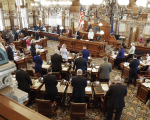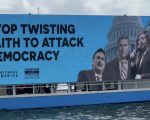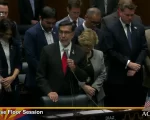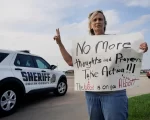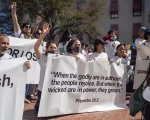Church and State: Republicans Revel in Divine Plan to Turn Kansas Into ‘Conservative Sanctuary’
Lawmakers routinely entertain policy ideas shaped by fringe religious views — restrictions placed on transgender residents, anti-abortion propaganda, tax dollars for private schools, a refusal to acknowledge systemic racism.
Christian Leaders Continue Opposition to ReAwaken America Tour — at Trump Resort
A group of local clergy and national faith leaders spoke in opposition to the Trump National Doral Miami stop of the ReAwaken America Tour.
Faith-Based Refugee Resettlement Agencies Denounce New Asylum Rule
The new rule, which goes into effect May 16, rejects asylum claims for most people who cross the border but do not first seek asylum in Mexico.
Amid Confusion Along US-Mexico Border, El Paso Pastors Provide Migrants with Shelter & Counsel
As changing policies, rampant misinformation, and exasperated, fearful crowds converge in this desert city, faith leaders are striving to provide shelter and uplift. Along with prayers, they are counseling migrants about the daunting challenges that await them on U.S. soil, with enormous backlogs in asylum hearings and the Biden administration’s newly announced measures that many consider stricter than the existing ones known as Title 42.
Spiritual Squabbles in Statehouses
This issue of A Public Witness looks at recent faith squabbles in statehouses and how this could impact Christian Nationalistic legislative efforts in a Capitol near you.
COVID-19 Health Emergency Is Ending but Faith-Based Vaccine Clinics Continue
Over the last few years, African American congregations have provided outsized action on getting people tested and vaccinated.
Texas Legislature Passes Bill Allowing Chaplains in Public Schools
‘I worry that this bill will lead to Christian nationalists infiltrating our public schools and indoctrinating our students,’ said Texas state Rep. James Talarico, a Democrat and Presbyterian seminarian.
Why Habitat for Humanity’s Theology of the Hammer Offers Hope in Polarized Times
For nearly five decades, Habitat for Humanity has inspired people from different backgrounds — who often can’t agree on anything — to work together for their neighbors’ benefit.
Thoughts & Prayers (& Blood)
This issue of A Public Witness looks at the divergent behaviors of Texas Gov. Greg Abbott on political issues before considering the protesters at an official prayer vigil in Allen, Texas, on Sunday.
Latino Faith Leaders Continue Pressure Against Gov. Ron DeSantis’ Immigration Bill
'This legislation, if adopted, would incite fear and create barriers of needed care that our church immigrant and refugee ministries engage,' reads a letter signed by hundreds of Latino pastors, faith leaders, and congregants.

